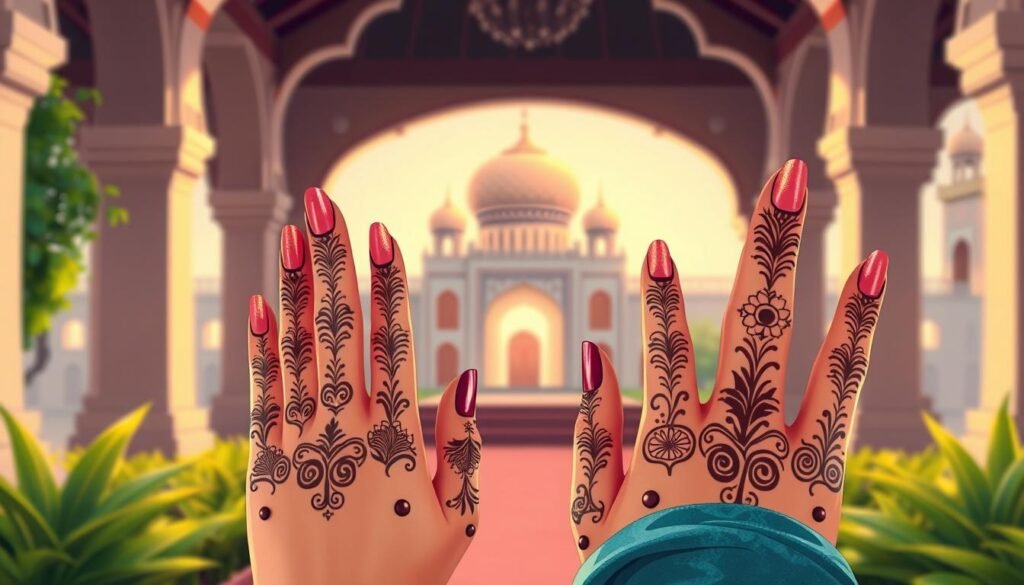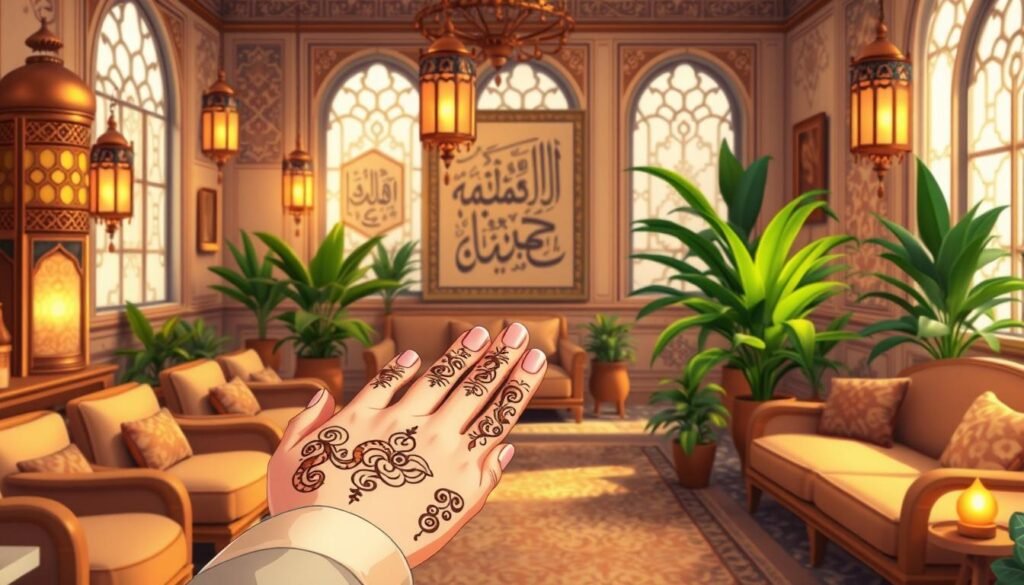Have you ever stood in front of a nail salon’s colorful polish displays? You might want to look your best but wonder if it’s okay with your faith. The question of nail polish in Islam is more than just beauty. It’s about finding a balance between tradition and today’s world.
As the global halal cosmetics market grows, millions of Muslim women ask: can muslims get their nails done without breaking their prayers?
Imagine choosing a vibrant manicure for an Eid celebration, then worrying about wudu. The worry isn’t the polish but if it stops water from reaching your nails. This detail is key in Islamic rulings on nails.
For years, scholars have debated this. They look at Quran 2:185, which says to make things easy, not hard. But they also think about the practical parts of daily prayer.
Now, halal-certified brands like those approved by the Islamic Society of Washington Area (ISWA) offer breathable polishes. These let water through. But, there’s confusion. Is it okay to wear acrylic nails during Ramadan? Can breathable polishes really solve the wudu problem?
This article doesn’t just say yes or no. It looks at the middle ground where faith and fashion meet.
Let’s explore old principles through a modern view. We’ll talk about breathable polishes, henna artistry, and the quiet strength of women who plan their salon visits around prayer. Beauty and faith shouldn’t be against each other, right?
Understanding Islamic Perspectives on Beauty Practices
Beauty in Islam is more than looks. It’s about finding a balance between showing who you are and following your faith. Islamic beauty practices focus on being moderate. They make sure beauty doesn’t go against modesty or practicality.
Experts say zeenah (adornment) is okay if it respects faith. This balance helps Muslims decide on things like nail care. They make sure beauty doesn’t get in the way of rituals like wudu.
The Balance Between Beauty and Religious Obligations
Islam teaches to enhance beauty naturally but not too much. Hadiths praise simple beauty, but there are rules like dressing elegantly (Quran 7:31). For example, nail care must let water reach the nail bed during wudu.
This is why breathable polishes are popular. It makes sure faith practices aren’t blocked by personal style.
Core Islamic Principles That Guide Beauty Decisions
Principles like being sincere (niyyah) and not copying others guide beauty choices. The Prophet’s may peace be upon him advice to “beautify yourself for Allah” shows the importance of intention. Today, debates on nail treatments focus on if they stop religious acts, like artificial nails stopping wudu.
Experts warn against extremes. They say not to reject beauty or let trends come before worship.
Varying Interpretations Across Different Schools of Thought
Scholars have different views on nail polishes. Hanafi scholars often say breathable polishes are okay, while others say nails must be fully accessible. These differences show how Islam can adapt.
By understanding these views, Muslims can make choices like nail care with faithfulness.
The Traditional Ruling on Nail Polish for Muslim Women
At the heart of debates over nail polish wudu lies a centuries-old principle. Ritual purity depends on water touching all body parts during ablution. Traditional Islamic nail rulings stress this requirement, making regular polish a point of contention.
For many scholars, the issue isn’t about looks but function. Water must reach the skin beneath. Let’s explore why.
Why Regular Nail Polish Creates Wudu Issues
Chemical ingredients in standard polish form a waterproof layer. Film-formers like polymers seal the nail bed, creating a barrier. Imagine dropping an Alka-Seltzer tablet—nail polish wudu compliance requires it to dissolve.
If it doesn’t, the polish fails the test. Even clear polish, free of colorants, often contains these water-resistant compounds. This scientific reality underpins why many scholars label it is nail polish haram.
Scholarly Consensus on Conventional Products
Mainstream jurists across Sunni schools agree that any obstruction during ablution voids ritual purity. Scholars like Sheikh Yusuf Qaradawi and the European Council for Fatwa cite the barrier issue as definitive.
The is nail polish haram debate isn’t about modesty but practicality. Water must physically touch the skin. This consensus even extends to modern rulings on breathable alternatives, which scholars now increasingly endorse.
Historical Context of These Rulings
Early Muslims used henna, which soaks into the nail bed without sealing it. Unlike chemical polishes, henna’s porous nature aligns with the Prophet’s sunnah. Traditional rulings evolved to address innovations like synthetic polishes, which emerged only in the 20th century.
This distinction clarifies why historical traditional Islamic nail rulings didn’t prohibit beauty—only substances that disrupt ritual purity.
Can Muslims Get Their Nails Done? Exploring the Options
Can Muslim women get nails done and follow Islamic teachings? This question leads us to look at halal nail options. Today, we have new choices that respect Islamic values like keeping wudu easy and being modest.
For example, there are breathable polishes that let water in during ablutions. This helps with keeping rituals pure. Henna, a favorite for centuries, is also popular. It mixes tradition with beauty.

Halal nail products are growing fast, up 25% each year. This shows more Muslims want products that fit their faith. Press-on nails, used by 70% of Muslim women, are okay if they don’t block water.
Experts say it’s all about the intention. Decorations should not draw too much attention and should not stop religious acts. Some worry about acrylics because they might block wudu. But, 90% of scholars say full-coverage acrylics are not okay.
Islamic teachings aim for balance. Choosing between temporary gels or organic stains is about what feels right to each person. An expert says, “Beauty and belief don’t have to fight when choices match our values.” Muslim women find ways to care for their nails that show their faith and identity.
Permissible Nail Care Practices in Islam
Islamic traditions guide us to keep beauty while following religious rules. For halal nail care, henna is a great choice. It fades naturally and doesn’t block wudu. This plant-based option fits with modest yet elegant adornment teachings.
“Whosoever imitates a people is among them,” a Hadith from Abu Dawood reminds us to be mindful of culture. But henna’s long history shows beauty and faith can go hand in hand.
Nail buffing and cuticle care are good alternatives to polish. They keep nails healthy without blocking wudu. Buffing makes nails shine while keeping skin moist, a practice many scholars agree with.
Getting manicures at the right time respects worship schedules. For example, you can get a manicure between prayers or during menstruation. This way, you can enjoy beauty without breaking religious rules.
Natural nail care for Muslims is about finding beauty in proven ways. Brands like Al-Mahra and HennaArt USA offer products that fit these principles. Scholars say there are temporary solutions within Islamic nail alternatives, even if innovation is slow. For more on balancing faith and modernity, check out rulings on prayer obligations here.
Breathable Nail Polish: A Modern Solution
In the debate over halal nail polish, a new solution has emerged. Water permeable nail polish lets water reach the skin during wudu. This solves the problem of traditional polishes blocking water.
Brands like Al Khair Beauty and Halal Polish offer these products. They are tested to ensure they let oxygen and moisture through.
These polishes have tiny holes in their layers. This is different from regular polishes that block everything. Dr. Yasir Qadhi says that if water can pass through, it might be okay.
But, some people are not sure. They think even a little bit of polish left behind could ruin wudu.
Halal nail polish brands also focus on safety. They avoid harmful chemicals. A 2023 report shows the global halal cosmetics market is growing fast.
It’s now worth $560M, thanks to products like breathable polish. These polishes last a long time and dry quickly. They don’t need harsh chemicals to remove them.
Breathable nail polish is a step towards combining tradition and modernity. It’s a good option, but it’s up to each person to decide. Do your homework—ask about tests and what’s in the polish. This shows how Islamic values can meet today’s beauty standards.
Navigating Nail Salons as a Muslim Woman
Choosing a nail salon doesn’t mean you have to give up your values. This guide helps you find places that respect Islamic practices. It covers everything from what products they use to how they adjust their services for you.

Questions to Ask Your Nail Technician
First, ask if they offer halal nail services. Make sure they use breathable polishes. Also, ask about the ingredients to ensure they’re pure.
Check if they paint your pinky toe. This is important for wudu. Ask if water can reach your natural nails during the service.
Finding Muslim-Friendly Nail Services
Look for Muslim-friendly nail salons on social media or in directories like Muslima Beauty. Many salons now use breathable polishes approved by Islamic scholars.
Ask your local masjid for recommendations. They often know good places. Look for salons that say they use breathable products and follow wudu rules.
Bringing Your Own Halal Products
Bring your own breathable polishes like Madiha Naturals or Henna Glow. Some salons might charge a little extra for this. But it’s worth it for the peace of mind.
For example, a $30 pedicure with your own henna is cheaper and purer. Always tell them you want to use your own polish for religious reasons.
Cultural Influences vs. Religious Requirements
It’s important to know the difference between Islamic vs cultural beauty practices. Henna adornments, for example, are a cultural nail practice enjoyed during Eid. They started as a fun tradition, not a religious rule. Experts say that rules about nail care come from keeping things clean, not from local styles.
Distinguishing Between Cultural Practices and Islamic Rulings
Many discussions mix up religious teachings with local customs. The Prophet used to trim his nails before praying, making it a special act. But today, whether to wear nail art is up for debate. Scholars look at the Quran to decide if something is for worship or just a cultural thing.
They ask: Does it help keep things clean (2:222) or is it just a community choice?
Regional Differences in Acceptance of Nail Treatments
In regional Muslim nail traditions, places like Southeast Asia love colorful henna. But in the Gulf, people prefer simple designs. In America, some converts mix both, using nail polish that lets water pass through for prayer.
This shows how where you are can change how you see religious texts. A 2001 study found 64% of African-American Muslims changed their ways to fit both their culture and faith.
Remember, being faithful is not just about following others. It’s about seeking knowledge and being humble. How do your choices show respect for both your faith and culture?
Special Circumstances: Weddings, Eid, and Special Occasions
Weddings and Eid are times to celebrate. But how do you keep beauty in line with Islamic values? Many scholars say Muslim wedding nails or Eid nail designs are okay as long as they’re temporary. They call this rukhsa (concession).
The important thing is to keep your heart and actions spiritually mindful.
“Exchange presents so that your love toward each other will increase.”
This hadith shows the Prophet’s love for generosity during celebrations. Many people add this value to their Islamic occasion nail care choices.
For Eid nail designs, breathable polishes like Inglot O2M are great. They let water vapor reach your nails during wuḍū’. At weddings, some choose temporary gels or henna that wash off easily.
When you pick a time for your manicure matters. Try to do it after worship or use stickers that don’t block water. This way, you can celebrate while following the rules. Balancing cultural traditions with faith is key. As one sister said, “My Eid nails were a joy but not an obligation—they faded naturally by the third day.”
Special occasions are times to reflect, not just to look good. Choosing nail care that respects both heart and tradition makes celebrations more meaningful. Remember, Allah loves beauty—and so should we, in a responsible way.
Embracing Beautiful Nails While Honoring Your Faith
Caring for your nails doesn’t mean you have to choose between faith and beauty. Islamic teachings value cleanliness and self-respect. These values match well with Muslim women nail care choices.
Over 90% of Muslims focus on personal hygiene. This is based on the Prophet’s example, including clean nails for rituals like wudu. This focus on cleanliness helps balance faith and beauty.
Natural henna and breathable polishes are good choices for Islamic beauty. Scholars say there are many options, like henna designs and wudu-friendly products. The rise in online Islamic studies shows more women want to make informed choices.
Modern options like breathable polishes show innovation meets tradition. Muslim women can honor their faith and express themselves. The Prophet taught modest elegance, making beauty a form of worship.
Choosing henna for Eid or halal nail products shows confidence in balance faith and beauty.
FAQ
Can Muslim women wear nail polish while observing wudu?
What are the core Islamic principles that guide beauty decisions?
How do different schools of thought view nail care for Muslim women?
What are some permissible nail care practices for Muslim women?
What is breathable nail polish, and is it acceptable in Islam?
What questions should I ask when visiting a nail salon?
Are there special considerations for nail care during significant life events?
How can I differentiate between cultural practices and Islamic rulings regarding nail treatments?
What should I consider when bringing my own halal products to a salon?
How do different regions influence attitudes toward nail care in the Muslim community?

Embracing Faith, One Insight at a Time!
The teachings of the Quran have always guided my path. With a deep passion for Islamic knowledge, I strive to blend the wisdom of tradition with the relevance of today, making the timeless messages of Islam accessible and meaningful for everyone.
Muslim Culture Hub is my platform to share historical insights and thought-provoking articles, exploring both well-known and lesser-discussed aspects of Islamic culture and beliefs. My mission is to create an inclusive online space where everyone can learn, strengthen their faith, and connect with the profound message of Islam.
Join the journey!
May peace be upon you.








